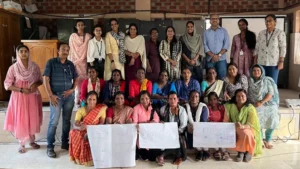As a part of my capstone project, I did my internship with Living Lab Alleppey, an initiative by IIT Bombay in the coastal town of Alappuzha, Kerala, focused on decentralised solid waste management through the bio bins.
The Waste Problem in Alappuzha
A few years ago, the town had a serious waste management problem. All the garbage used to go to a big dumping yard called Sarvodaya Puram, which caused a lot of pollution and health issues for people living nearby (Ganesan,2017). As per the report (https://www.downtoearth.org.in/waste/waste-smart-cities-54119), local people protested and blocked the road for 100 days, as a result of which, the landfill was shut down. That’s when the municipality, along with Dr T.M. Thomas Isaac, the then Member of the Legislative Assembly, started looking for a better solution. As a result, they came up with a solution by adopting a decentralised waste management initiative to tackle the problem in the town. As part of this decentralised solid waste management initiative, biogas and pipe composting were introduced in the town. Later, people started facing challenges while operating the biogas, such as maintenance of the biogas plant, the utility of the biogas produced, etc. To tackle this problem, in 2021, Bio Bins were introduced at the household level by the Municipal Corporation of the District.
The Bio Bin Solution
A Bio Bin is a three-bucket composting system designed for home use, allowing families to manage their kitchen waste effectively. As part of the ongoing waste management initiative, these bio-bins were introduced by the municipality to empower the people so that they can convert their own food waste into compost for their gardens, thereby reducing the dependency on landfills. Although this was a simple initiative, it required a big shift in how people think and behave towards their approach to waste management.
The Internship:
The aim of my internship project was to understand the acceptance and usage of Bio Bins in two municipal wards of Alappuzha, namely, Allissery and Erravukadu. 50 households, each
from both the wards, were selected as target areas for conducting the survey through a questionnaire. Interviews of the concerned stakeholders were conducted through a semi structured questionnaire, including municipal officers, sanitation workers (Haritha Karma Sena), community groups (Ayal Kootam), school principals, houseboat owners, fruit and vegetable sellers, restaurant owners, and shopkeepers. The questions were focused on acceptance and usage of Bio Bins as a solution for waste management at the household level.
The following are the key findings from the interviews conducted during the household surveys:
- People aged 31–50, especially professionals and homemakers, use bio-bins the most. ∙ Large families (more than 7 members), especially renters and daily wage workers, prefer using community aerobic bins because bio-bins are too small and fill up fast.
- 62% of people among those who are using bio-bins feel they get support from the municipality. On the other hand, the Neutral group accounts for 50% of those who stopped using bio-bins and 60% of those who never used them, showing that unclear or limited municipal support leads to lower acceptance and continued use of bio-bins. This shows that when support isn’t regularly provided, people are less likely to keep using bio-bins, highlighting the need for better and more visible help from the municipality.
- 97% say they separate their waste, but only 14% actually do it correctly. ∙ 86% mix wet and dry waste, causing bad smells, leakage, and poor compost. ∙ Before bio-bins, people dumped waste in open spaces or near others’ homes. ∙ 64% of users are happy and satisfied with using bio-bins.
Women’s Role and the Power of Community Engagement
Women played a big role in managing household waste, and many told me they felt proud to do something good for the environment. One of the inspiring parts of my internship was witnessing the power of community engagement. When neighbours learned together in workshops, they felt more responsible and took pride in their contributions to a cleaner environment. Whereas NGO like TAGS helped a lot by training local volunteers, organising events, and building trust between the community and the municipality. That stuck with me. It showed how even small actions at home can bring big changes in a city.
Testimonials:
Ward Counsellor: Earlier, people just dumped waste on the streets or in empty plots. Now they feel responsible.”
Household: “Earlier there were garbage scattered on the streets and birds used to scatter all the waste in the streets and locality, but when the people started using the bio bins, there were no birds seen after that and no more waste scattered around the street and now people can compost their kitchen waste in their homes”.
Policy Recommendations:
To boost the use of bio-bins in Alappuzha, regular training for municipal staff and HKS members is essential. Strong supply chains for materials like inoculum and coir pith should be established, along with expanded awareness campaigns, especially for youth.
Bio-bins and materials must be easily available in local stores. Ward-level composting clinics and improved bin designs can address user issues. Local supply centres, possibly run by Kudumbashree groups, should offer materials affordably, and residents should learn to use alternatives like first compost produced as a composting material for further decomposition process. Community involvement can grow through street-level “Green Champions,” regular meetings, and awards like “Best Clean Ward.” Public pledges and feedback can build accountability. A monitoring system and dedicated funding to train HKS members are needed, along with public-private partnerships to exchange surplus compost with the seeds and support households in the composting process.
Conclusion: Real Solutions Come from People
Working with Living Lab Alleppey taught me that real solutions don’t always come from textbooks. They come from talking to people, listening to their problems, and working together to find better ways. And in Alappuzha, they’re doing just that—turning waste into a useful compost at home. Waste management is not just about bins or rules—it’s about people, habits, and teamwork. Real change happens when communities come together, learn from each
other, and feel supported by their local government.





